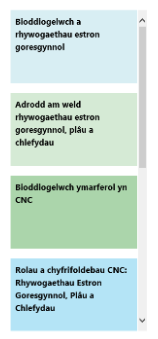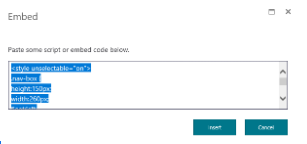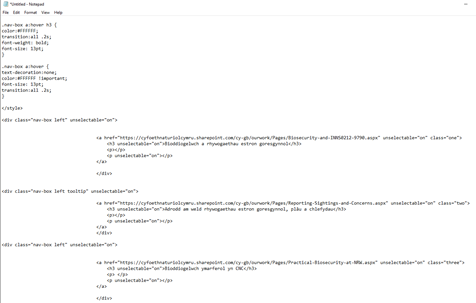Weeknotes 19/05/2023
Laura had a change from her usual Aberystwyth office and joined Sam, Phil and Owain in Cardiff for the day. The lure of our office camaraderie plus an AJ’s all day cooked breakfast was strong, but her Beyonce concert ticket swung it.
Anyway, it was lovely to see her and feel some of the pre-concert happy vibes.
Online permit applications
Sam is continuing to plug away at the feedback from permitting on the online waste permit applications and content. She has a great contact in the waste permitting team to ask dumb questions of.
Shaun and Andrew are working with SMEs on medium combustion plant forms, which sounds terribly complicated. They, and Alex, met with the industry regulatory team to discuss new content and a new form and are working with Claire the SME to ensure the user’s journey is as smooth as possible.
Andrew and Alex met with the marine team to discuss a new form for applications for discharging condition(s) of a marine licence. A first draft is done and it’ll be fine tuned in the coming weeks.
Check service
Laura, Sam and Lucinda got closer to publishing the ‘check if you’re allowed to use land we manage’ service. It’s a bit of a mouthful for a service name, but we’ve been round the houses at least a zillion times on it.
Among other things, the service enables users to check if they’re allowed to go horse riding on land we manage. All the evidence – including from our own website – shows that users call the thing they need a ‘permit’, but staff think this is confusing because we have permits for other things, like waste. Their preference is for it to be called ‘a permission’. A little content design challenge, amid many.
In other news, the design history for this service is coming along nicely. It helps us document our decision designs and how we reached them. And the user flow we’ve created helps show others how a fair bit of complexity can be neatly hidden from the user.
A tide of guidance
Sam and Soph have been working with the marine advisory team a lot this week. The team create guidance documents or position statements for an audience of both staff and marine developers. As their approach doesn’t line up with how digital content is created - around task-focused user needs - we’ve agreed a ‘for now’ approach. We publish accessible documents on a ‘gateway’ page that helps users find the document through search and nav and assess if it’ll be relevant to them.
Global accessibility awareness day (GAAD)
Phil wrote a lovely blog for GAAD, emphasising how accessible websites help all of us.
Form builder
Despite a few post-holiday woes, Lucinda was excited to share the news that the Smart Survey (our form builder) upgrade is happening. Roll on better forms and new ‘check’ services to test with users. More importantly, we’re happy that there are plans for more swimming with friendly sharks in beautiful parts of the world.
Content types
Laura’s published new content types that should help our comms colleagues (press releases, media statements and projects).
Projects
Laura and Sophie took their first steps towards removing out-of-date and duplicated project content from the website, and moving it to Citizen Space.
Strategic review of charging (SROC)
Alex has met with what’s left of the SROC team to discuss and create a publishing plan.
Umbraco update
Alex met the ICT-led website security project team to discuss the details of the content freeze to enable a communication plan to be developed to the wider business and the current Umbraco users (publishers).
Service design in practice
James and Lucinda have started their work-based project for the Service Design in Practice course. James is working with Welsh Government on designing a better application system for fishing licences. This is outside NRW’s responsibilities but there will be some good cross-over learning. Lucinda is working on making it easier for people to understand which permits they need to carry out certain tasks.
We look after the intranet too
A true digital team trooper, Kim spent another week mired in intranet publishing requests – the main one being updates to the section on invasive species. SMEs sent us a Word document of updated content: 5000 words to be spread across 9 pages. The content wasn’t track changed, nor the updates highlighted, so Kim had to send all of it for translation.
The intranet is challenging to work with. It’s slow to update, sometimes crashing halfway through a save. Formatting is a bit grim, too. If you copy and paste new content to an existing page, it can knock out the formatting on the rest of the page. This means we need to make an HTML fix.
Then there are tiles. Staff like to include tiles, perhaps because they’re seen as making the page more attractive. But they’re far from drag and drop. To create or change a tile we have to edit the HTML by copying to Notepad. This happens in English and in Welsh.



Tiles abound in another two large sections of the intranet Kim’s working on: the ‘programme managers’ office’ and the ‘manager’s toolkit’. With long lists of links to documents, tables, links to other pages, plus working on the Welsh intranet as a non-Welsh speaker, jobs like this can turn into big pieces of work.
As a prolific intranet publisher, Kim is now well known across NRW as her name appears on any page she creates or updates. She gets lots of emails from staff asking her about the content.
Patience of a saint.
Annual reports (hefty ones)
In the background, Sophie’s been busy building out the diversity and inclusion annual report for 2022-2023 into an accessible webpage to sit on our website and intranet. This is a massive 50-odd page document (100 if you include the translation) packed full of tables so that’s a fun time!